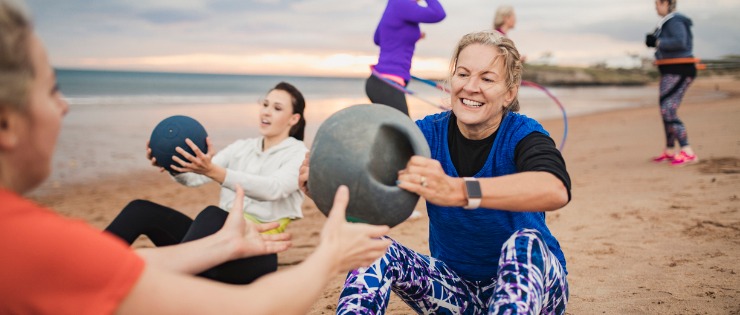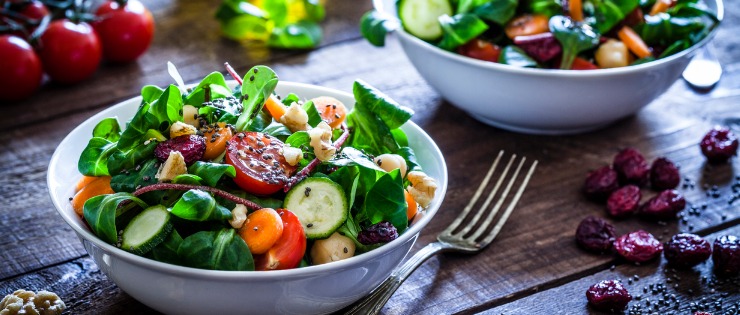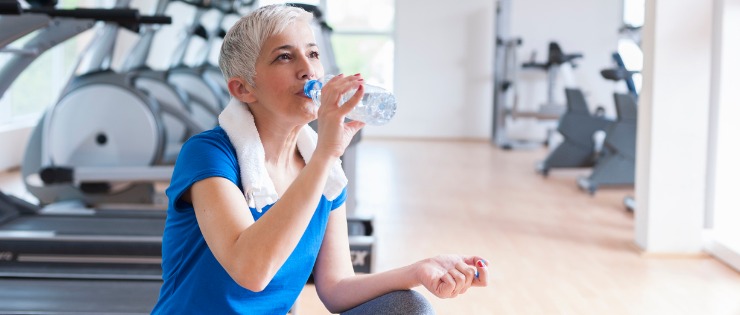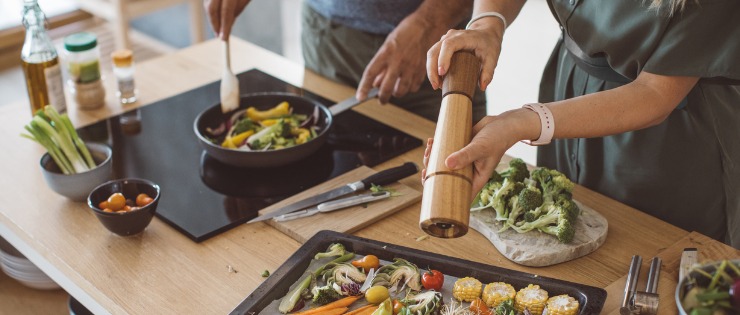
It’s true losing weight gets harder with age. There are several reasons why your belt might need letting out a notch, once you celebrate a half century. A slowing metabolism, sedentary lifestyle, reduced muscle mass, and poor sleep habits can all make losing weight difficult. While it might feel like your body is working against you, there are some things you can do to tip the scales in your favour.
#1 Boost Your Metabolism
We give too little recognition to our metabolism in our younger years, but when it slows down later in life; we realise its true value. Even for people who have been a small build all their adult life, after 50 they might have to think twice before reaching for a sweet treat. Their fast metabolism may have taken care of the extra éclair once upon a time, but now they don’t enjoy the same luxuries at 50.
With age muscle volume decreases and fat tissue increases. From the age of 30, most people lose 3-8% of their muscle mass per decade, but the rate of decline is faster after 60.
Researchers think this decrease in muscle mass is responsible for decreases in the basal metabolic rate with age. But there are some steps to help keep your metabolism firing.
- Eat a diet high in protein to reduce age-related muscle degeneration
- Move your body throughout the day
- Eat zinc-rich foods or take a supplement for a healthy thyroid
- Drink green tea for a boost in catechins, an antioxidant that supports metabolic health

#2 Strength Training
Undertaking strength training is great for turning fat into muscle. The more muscle you have, the more calories you burn during exercise and at rest. It’s estimated that muscle burns up to three times more calories than fat.
Every strength training session provides fat burning benefits long after you leave the gym. Excess post-exercise oxygen consumption (EPOC) causes the body to burn calories for 24-48 hours after while it repairs stressed muscle tissue.
If you’re worried about injuries, choose low-impact strength training that doesn’t put stress on your joints like running can.
As well as promoting weight loss, strength training can also help with improving your posture, endurance, strength and reduce your chance of injury, all important factors for improved health in your later years.
#3 Make Changes to Your Diet
One of the most effective ways to lose weight is to change your diet, but it can be hard. It takes discipline to give up your favourite dessert or that glass of wine with dinner. While you shouldn’t cut out every indulgence in your life, think of ways you can make it healthier.
Rather than buying take away once a week, try making a similar version at home. Changing some foods you eat to low sugar and reduced fat can make a difference in the calories you consume.
Much of eating healthy is being organised. Try meal planning on the weekend and buying the ingredients so you don’t fall into the trap of making quick and easy choices that aren’t the most healthy. If you buy your lunch at work, take it from home so you know what it contains.

Look at portion control as a way of cutting down on calories. Many Australians serve themselves a large dinner plate or go back for seconds when their body only needs half the meal size. Your teenage son’s meal should be bigger than yours because he’s likely to be more active and has a much faster metabolism than you.
Remember, alcohol and mixers can contain huge numbers of calories. Cut back on your alcohol consumption and choose low calorie options.
Some people think they’re hungry so reach for a snack when they’re only thirsty. Keep up your water intake during the day and if your portion sizes are too large, drink a glass of water before your meal so you’re satisfied and not tempted to go back for more.
#4 Improve Your Sleep Patterns
Research tells us there is a strong connection between inadequate sleep and being overweight. The less sleep you get, the more likely you are to put on the unwanted kilos.
One study showed women who only have five hours of sleep per night are 32% more likely to gain a lot of weight (33 pounds) compared to women who slept seven hours. It’s thought insufficient sleep causes changes in hormones which can increase appetite and reduce the body’s ability to know when we’re full. Inadequate sleep may also cause the brain to respond to unhealthy food options so they find it difficult to resist. Poor sleep can also lower the metabolic rate and affect insulin production.
Good quality sleep can be more difficult to gain later in life so it’s important to sort out any sleep problems in your 50s. Remember to try keeping your bedtime the same time each night and turn off the TV and any devices at least half an hour before bed. See your doctor about a sleep study if you have any concerns.
#5 Sit Less at Work & Home
Many people in their 50s have finished running after young children and spend the bulk of their week working in sedentary jobs. According to juststand.org, the average person sits 7.7 hours per day but some people sit for 15 hours.
If you’re seated for most of your workday, try using a standing desk. By standing instead of sitting at work, you can burn up to 0.2 calories per minute more. Standing for an extra three hours per day could see you burn an extra 30,000 extra calories and around 4 kg of fat per year. If you need some motivation, use the Calorie Burn Calculator to find out how many calories you can burn standing instead of sitting.
It’s not just your time at work that matters. It’s understandable that you want to sit on the lounge after a hard day at work, but you need ways to move more at home.

Make it part of your routine to go for a walk before or after dinner each night. See how many chores you can get done rushing around the house in half an hour. Only turn on the TV as a reward for completing your daily steps goal.
#6 Hire a Personal Trainer
If you haven’t spent much time at the gym or doing any regular exercise,by the time you’re 50, likely you won’t know what to do to help you lose weight. Joining up to the local gym and trying to use the exercise equipment with no guidance could see you gain an injury and not lose any weight. A musculoskeletal injury can stop you from doing any exercise for many months and cause you to need time off work.
Investing in a personal trainer for at least a few sessions will allow you to learn how to use the gym equipment correctly. If you have a previous or existing injury, a trainer can show you how to exercise so you don’t aggravate or reinjure yourself. Find out what type of exercise will work best for your body shape and achieving your weight and fitness goals. Ask your trainer plenty of questions and write a few notes to remind yourself if you will go it alone in the future.
#7 Change the Time You Eat
Many people eat tiny portions for breakfast and lunch, then go home to a huge dinner before bed. The body has no time to use the bulk of the calories and they end up being stored as fat while we sleep. Try switching your biggest meal of the day to lunch and then a light dinner well before bed. A small meal before bed can also help if you struggle to fall asleep.
#8 Up Your Water Intake
Water is not only vital for flushing toxins from the body, it helps regulate body temperature and improve metabolism. Water can also aid in losing weight. Drinking more water stops your body from retaining water.

Drinking cold water can also increase the amount of calories you burn. A study of overweight women who increased their water intake to over one litre per day lost an extra 2 kg in weight making no other lifestyle changes.
Water can also make a difference if you use it as an appetite suppressant. Rather than reaching for a snack when you’re feeling hungry, drink a tall glass of water instead. Drinking water before a meal can stop you overloading your plate or going back for seconds.
#9 Intermittent Fasting
The jury is still out on whether intermittent fasting is beneficial, but thousands of people worldwide are advocates. Eating a low calorie diet two days per week and a normal diet the other five days can help shed the kilos. During the fasting period, your body can’t use a recently consumed meal as energy so it pulls from the fat stored in your body as its source of energy.
The Blood Sugar Diet introduced by Dr Michael Moseley in 2015 has gained in popularity with many people claiming it to be the easiest form of weight loss they have tried. Some people like to only count calories for two days of the week instead of seven. The plan now recommends eating a Mediterranean-Style Diet on the other five days. However, limiting your calorie intake to 800 can make it hard for some people to concentrate and be a challenge for active people.
#10 Mindful Eating
For years you may have scoffed down your food with little thought. As we age, it’s time to slow down various aspects of our life including our eating. By slowing down you can make eating an intentional act rather than an automatic one. Understanding when you are hungry and full helps distinguish the difference between emotional and real hunger.

Whatever healthy diet you follow, doing it mindfully can help keep off the unwanted kilos.
Mindful eating involves:
- Eating slowly without other distractions
- Listening to hunger cues and eating only until full
- Engaging your senses to notice the colour, smells, sound, texture, flavour of food
- Appreciating your food
- Realising the effects food has on your feelings
#11 Find an Accountability Partner
Nothing helps losing weight like an accountability partner. If you don’t think you can will yourself to get out of bed on a cold morning, not wanting to let down a friend could give you the motivation you need.
Encourage each other by exercising together and tracking your weight loss. If you can’t find a partner, tell friends and family of your weight loss goal and the date you hope to achieve it by. No one wants to feel like they’ve failed.
#12 Visit Your Doctor
Regular health checks are even more important once you hit 50. A blood test is the only way to tell if you’re low in essential vitamins and minerals or you have a thyroid problem. A blood test can also detect if your hormones are out of balance, playing havoc with your metabolism and the ability to lose weight. The average age for Australian women to experience menopause is between late 40’s and early 50’s. Once you have the results, a simple supplement or change to your diet can make all the difference in being able to lose weight.

Your doctor may refer you to a dietician who can help with support and guidance during your weight loss journey. Having someone help with meal suggestions can make all the difference in being able to lose weight. If you’re thinking about changing your exercise regime or making dietary changes, speak to your doctor first.